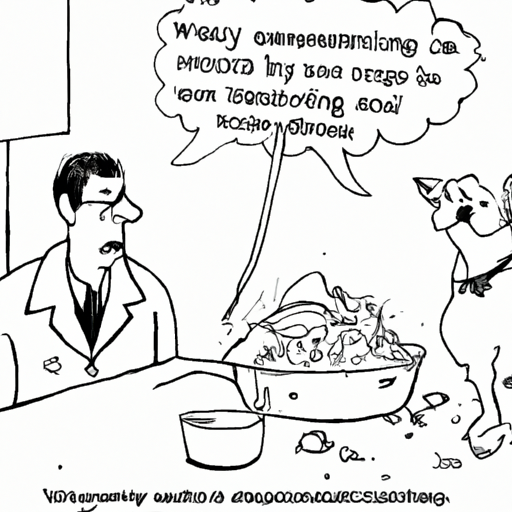As a caregiver, it can be distressing to see your furry friend in distress, one common issue being vomiting. Vomiting in dogs may be caused by several factors and understanding them can help you provide the best care possible.
1. Understanding Canine Digestive System
The canine digestive system operates much like ours. Food travels from the mouth, down the esophagus, and into the stomach, where digestive enzymes break it down. However, sometimes, this journey is interrupted, resulting in your dog throwing up their food.
- Speed Eating: Dogs that eat too quickly may not chew their food thoroughly, leading to larger chunks of food that are harder to digest. This can cause discomfort and induce vomiting.
- Overeating: Just like people, dogs can overeat, causing their stomachs to stretch uncomfortably. This can trigger the vomiting reflex as the body attempts to relieve the pressure.
- Food Intolerances: Dogs can develop intolerances or allergies to certain foods. If your dog vomits shortly after eating a new type of food, this could be the cause.
2. Common Causes for Vomiting in Dogs
Understanding the common causes can help you identify the possible trigger and take the necessary steps.
- Dietary indiscretion: Dogs are known for eating things they shouldn’t. Consumption of non-food items or spoiled food can lead to vomiting.
- Infections: Diseases such as pancreatitis, kidney failure, or liver disease can cause vomiting in dogs.
- Parasites: Worms or other intestinal parasites can irritate the digestive system, leading to vomiting.
- Medication side effects: Some medications may cause nausea and vomiting in dogs.
3. When to Seek Veterinary Help
While an occasional episode of vomiting might not be a cause for alarm, frequent or severe vomiting can be a sign of a more serious condition. Here are some signs that it’s time to seek veterinary help:
- Vomiting is frequent or continuous
- Your dog is lethargic or unusually quiet
- There is blood in the vomit
- Your dog has a fever
- There is a sudden change in appetite or water consumption
4. Preventing Vomiting in Dogs
There are several steps you can take to prevent or reduce the frequency of vomiting.
- Feed your dog smaller, more frequent meals.
- Ensure your dog has access to fresh water at all times.
- Keep garbage and potentially harmful substances out of your dog’s reach.
- Regularly deworm your dog and keep up with their vaccinations.
5. FAQ
Q: Can I give my dog human medication for vomiting?
A: No, many human medications can be harmful to dogs. Always consult with a vet before giving your dog any medication.
Q: My dog has vomited once, should I be worried?
A: An isolated incident of vomiting is usually not a cause for concern. However, if your dog vomits repeatedly or exhibits other symptoms, consult a vet.
Q: Can my dog’s diet cause vomiting?
A: Yes, dietary changes, food allergies or intolerances can cause vomiting.
Q: What can I do to prevent my dog from vomiting?
A: Regular vet check-ups, a balanced diet, and ensuring your dog doesn’t eat anything harmful can help prevent vomiting.
As a caregiver, the health and wellbeing of your pet is paramount. By understanding why dogs might throw up their food, you can make informed decisions for their care. Always remember, when in doubt, consult your vet.



